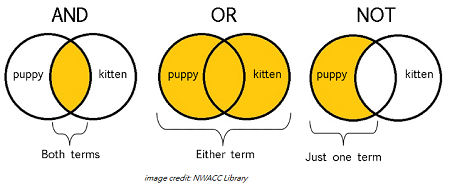Keywords, also commonly called search terms, are the words that you enter into the database search boxes. They represent the main concepts of your research topic. Without the right keywords, you may have difficulty finding the articles that you need. More technically, a computer program indexes "significant" words used within the title, summary (abstract), subject headings, or text of an article. All of these words are “searchable.” When you type in one or more of these significant words into a search box, this is called Keyword Searching.
Selecting keywords is a multi-step process that involves:
- identifying the main concepts of your topic
- brainstorming synonyms that could also be used to describe your topic
- Avoid Word Vomit:
Example 1: "I'm interested in searching about video games about war and if watching or playing violent video games can affect someone's behavior."
What keywords can this sentence be reduced to?
- Example 2: "I want to seach about the effects of sun tanning at Daytona Beach, FL, on the skin and whether or not sun tanning can increase the chance of getting cancer and how to prevent it."
Keywords:
- Example 3: "I'm considering becoming a vegetarian even though I really like Burger King and I want to know if a vegetarian diet is as healthy as eating meat because I don't like the idea of slaughtering animals for my food."
Keywords:
It is rare that your first search will return perfect results. It usually takes trial & error to determine which keywords work best for your topic. Be prepared to run multiple searches in your quest for the keywords that will help you find the materials you need. And remember, learn as you search! And mine multiple databases!
STOP WORDS: the, a, of, at, by, this, that, etc. In other words, articles, prepositions and other small words are ignored by search engines and databases.
(Google may reward word vomit because it's so BIG. Databases are not so big and may penalize word vomit.)
Wikipedia: Can be good place to start research. Follow the Citation Trail!
Using Boolean Logic
